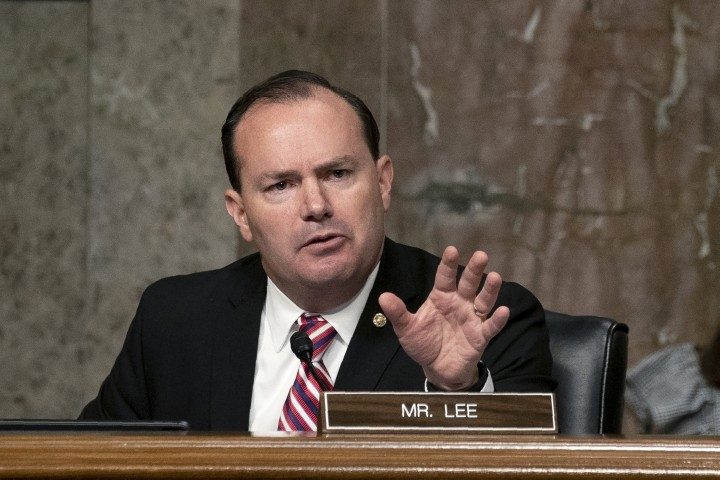
Senator Mike Lee (R-Utah) created quite a bit of controversy with a couple of tweets he sent out during and after the vice-presidential debate.
“The word ‘democracy’ appears nowhere in the Constitution, perhaps because our form of government is not a democracy. It’s a constitutional republic. To me it matters. It should matter to anyone who worries about the excessive accumulation of power in the hands of the few,” Lee tweeted, apparently in response to a statement made by Democratic VP candidate Kamala Harris during her “debate” with her Republican counterpart, Vice President Mike Pence.
For nearly half an hour after that first tweet, Lee continued tweeting the truth to a bunch of people who prefer not to hear it.
“We’re not a democracy” was followed by “Democracy isn’t the objective; liberty, peace, and prospefity [sic] are. We want the human condition to flourish. Rank democracy can thwart that.”
That was as much as the benighted twitterverse could handle.
Steven Schmidt, a former advisor to the late Senator John McCain and co-founder of the anti-Trump Lincoln Project, decided to respond to Lee and reveal his own ignorance of not only the American system of government, but of the definition of basic forms of government, tweeting:
“The attainment of liberty, peace and prosperity can only be achieved through democracy. This isn’t an abstract, academic argument that Sen. Mike Lee is making. It is the authoritarian argument in a nutshell. Astonishing statement from a United States Senator.”
Schmidt followed this embarrassing demonstration of his lack of erudition by tagging the Lincoln Project and tweeting, “It would be fun to run against this guy,” adding, “Someone should think about it.”
Dan Pfeiffer, a former advisor to Barack Obama, added his two cents, tweeting, “Majority rule is a huge problem for a party with an agenda opposed by a majority of Americans.”
At this point, Lee’s tweets on the difference between a democracy and a republic — terms that a few generations ago were known by schoolchildren to describe two very different forms of government — attracted the attention of the mouth-breathing media, most of whom made their own lack of education evident by mocking Lee’s denigration of democracy.
One of Lee’s spokesmen, Conn Carroll, responded to the backlash, including sending the following in an e-mail to Vox:
At a time when Democrats want to pack the Court, eliminate the Electoral College, and turn the Senate into the House, it is very good that Americans are re-reading The Federalist Papers to rediscover why the founders put these specific republican checks on democratic passion into the Constitution.
Remarkably, Lee’s favoring of republicanism over democracy caused so much confusion, even among some conservatives, that the senator felt compelled to explain himself, telling the Washington Examiner:
I get why people use the term [democracy]. I also understand why a lot of people would think of it as either a non-issue or not something to be concerned about. But as I think about it, I think it’s a big deal, because in many ways, the whole idea of having a constitution itself, particularly a constitution that establishes a constitutional republic like ours, is materially different and distinct from a democracy.
It seems shameful that it is necessary to defend a statement preferring a republic to a democracy — much less one insisting that the United States is a republic and not a democracy — but that’s where we are in this country.
As anyone who has bothered to read the words of the men who wrote our Constitution knows, America is not a democracy, and most of the men whose signatures appear at the bottom of that document would never have endorsed it had they thought for a minute they were creating a democracy.
And, speaking of the Federalist Papers, James Madison, known as the “Father of the Constitution,” wrote in The Federalist, No. 10: “Democracies have ever been spectacles of turbulence and contention; have ever been found incompatible with personal security, or the rights of property; and have in general been as short in their lives as they are violent in their deaths.”
Madison’s Federalist co-author, Alexander Hamilton, added his testimony to that of Madison and Lee, declaring, “It has been observed that a pure democracy if it were practicable would be the most perfect government. Experience has proved that no position is more false than this. The ancient democracies in which the people themselves deliberated never possessed one good feature of government. Their very character was tyranny; their figure deformity.”
Speaking of Hamilton and democracy, it’s a good thing he didn’t have a Twitter account because you can only imagine how the Lincoln Project would have responded to this statement made by Hamilton at the Constitutional Convention of 1787: “We are a Republican Government. Real liberty is never found in despotism or in the extremes of Democracy.”
Senator Lee was correct and, were Americans aware of what were once considered elementary concepts of government, his tweets should have elicited nothing more than an eye roll.
Maybe that’s the problem: Maybe Senator Lee’s accurate analysis of the government of the states in the American union would not have been so newsworthy had the people of that union not surrendered the education of generations of their children to strangers, strangers who themselves often haven’t been taught the difference between a democracy and a republic.
For those unconvinced by the foregoing explanations, I’ll end with this famous exchange between a Spartan and Lycurgus, the famed author of that Greek city-state’s constitution.
In response to a man who approached him and asked him why, given the opportunity to establish a government in Sparta, he did not establish a democracy, Lycurgus said:
“If you are so fond of democracy, why don’t you go establish one in your own house.”
Enough said.



